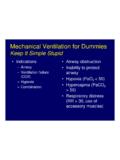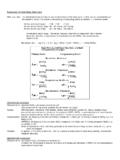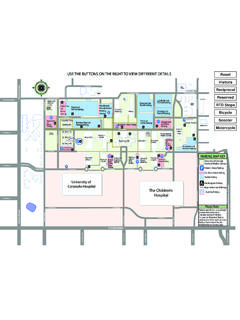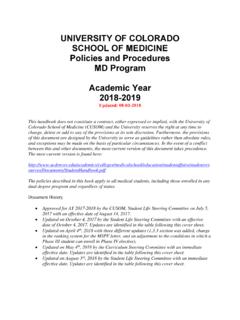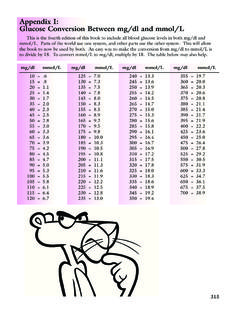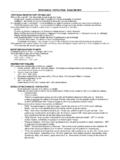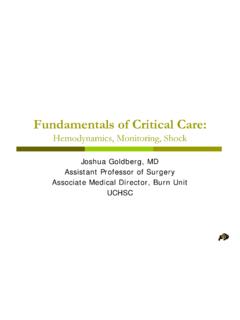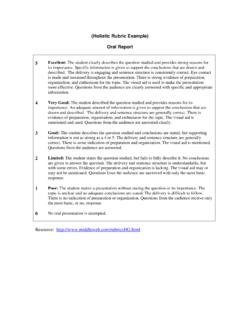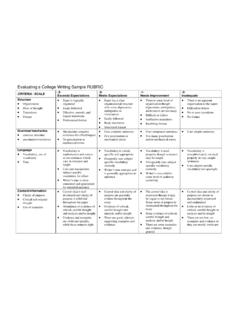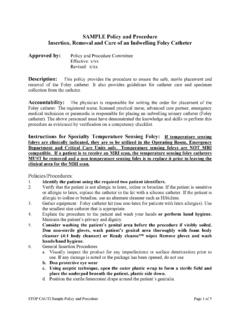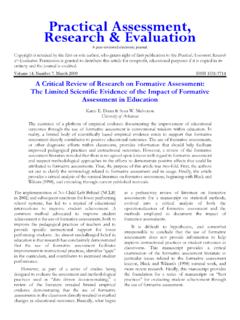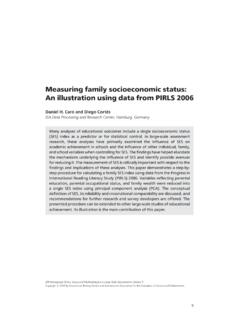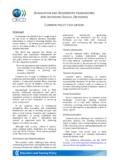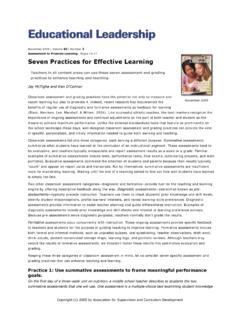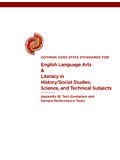Transcription of ACGME Common Program Requirements - Semiannual …
1 Revised November 7, 2012 Page 1 of 2 ACGME Common Program Requirements - Semiannual Evaluations V. evaluation A. Resident evaluation 1. formative evaluation a. The faculty must evaluate resident performance in a timely manner during each rotation or similar educational assignment, and document this evaluation at completion of the assignment. b. The Program must: (1) provide objective assessments of competence in patient care and procedural skills, medical knowledge, practice-based learning and improvement, interpersonal and communication skills, professionalism, and systems-based practice based on the specialty-specific Milestones; (2) use multiple evaluators ( , faculty, peers, patients, self, and other professional staff); (3) document progressive resident performance improvement appropriate to educational level.
2 And (4) provide each resident with documented Semiannual evaluation of performance with feedback. c. The evaluations of resident performance must be accessible for review by the resident, in accordance with institutional policy. ACGME WebADS Required Annual Information- Overall evaluation Methods: Assessment system: Provide the methods of evaluation used for assessing resident competence in each of the six required ACGME competencies. Identify the evaluators for each method Semiannual reviews: Provide a description of the process used by the Program for the Semiannual evaluation of all resident o The Clinical Competency Committee assists the Program director in assessing each resident/fellows performance o The Program director (or a designee) meets with each resident/fellow semi-annually to conduct a formal written evaluation of performance.
3 Designate an individual to monitor Semiannual reviews to help assure that they take place as scheduled and to assist the PD and CCC with data gathering. Clinical Competency Committees (CCC)- role in resident assessment Each Program is expected to form a CCC and begin to develop its members by June 2013. The members of the CCC make a consensus decision on the progress of each resident. Initially, the existing resident assessment data, tools and faculty observations will be utilized in the evaluation process. Beginning 2013, the CCC assessments will use data from the Educational Milestone assessments.
4 The CCC approach provides insight and perspectives of a group of faculty in the resident evaluation process. The CCC also serves as an early warning system if a resident fails to progress in the Program , and will assist in early identification to move toward improvement and remediation. GMEC Requirements : All non-accredited and accredited programs must evaluate residents/fellows and conduct the Semiannual process The 1st semi-annual evaluation must be completed no later than January 31st; the 2nd semi-annual evaluation must be completed no later than June 15th. These dates must be entered in Med Hub.
5 How to enter Semi-Annual Review Dates into MedHub: 1. From MyHome select resident from the resident pull down under User Management (middle column) 2. Click the Test Scores Tab 3. Enter the 2012-13 Semi-Annual Review Dates/Final Summative Letter Dates into the field: Semi-Annual Review (PGY) according to PGY-level 4. Click the Floppy Disc Icon to save changes Revised November 7, 2012 Page 2 of 2 University of Colorado School of Medicine Office of Graduate Medical Education Semi-Annual evaluation Required Elements Checklist (1st six-months and 2nd six-months) Conference Participation and Attendance- percent attended Quality Improvement and patient safety involvement/project (plan, status, outcome) Scholarly/Research activity/project (plan, status) Procedure/Case/Patient Logs In-service scores (review ranking within their PGY class and/or Nationally)
6 Program Director evaluation of Resident Process: Review all data, aggregate and summarize evaluations by core competency regarding the resident/fellow from: (All evaluation forms must be competency based) Faculty (of resident performance during each rotation or similar educational assignment) Professional Staff Evaluators (NP, PA, PT, Nurses, clinic staff, etc) Patients (some RRC Requirements may specify a minimum number of patient evaluations from clinic encounters) Self- evaluation Peer, Students, Other Discuss/ensure that residents have: Evaluated faculty, rotations, and/or Program to date Duty Hour Compliance (logging, issues?)
7 Fatigue Moonlighting Status, if applicable Supervision: Adequate/issues ACLS/PALS or other required certifications, etc. USMLE Step 3/COMLEX 3 (passing score required by Dec. 31st to advance to PGY 3 level) Other areas relevant for your specialty Document: Progressive resident performance improvement appropriate to educational level Review Program Promotion/Advancement Criteria policy Overall Performance Rating and Summary Strengths Areas for improvement
